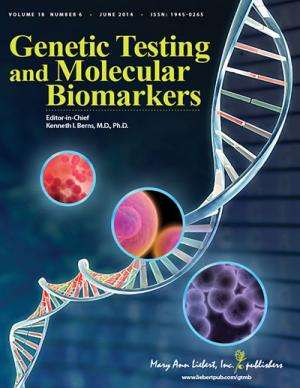Genetic testing for alcohol dependence risk in African Americans

Alcohol dependence (AD) has a genetic component and testing can determine a person's genetic risk for susceptibility to AD. A new study shows that while more than 85% of the African American adults expressed an interest in genetic testing for AD susceptibility, many had ethical, privacy, and procedural concerns, as reported in Genetic Testing and Molecular Biomarkers.
Denise Scott and coauthors from Howard University (Washington, DC) and Johns Hopkins University Bloomberg School of Public Health (Baltimore, MD) offered hypothetical genetic testing for AD susceptibility to more than 300 African American adults to determine their interest level. The researchers documented the factors that contributed to an interest in being tested and those that might keep people from undergoing genetic risk assessment due to concerns over the testing methods and how the results would be used in the article "Genetic Testing for the Susceptibility to Alcohol Dependence: Interest and Concerns in an African American Population."
"The article documents the interest the African American community has about a possible genetic basis for alcoholism tempered by a real concern about privacy," says Kenneth I. Berns, MD, PhD, Editor-in-Chief of Genetic Testing and Molecular Biomarkers, and Director of the University of Florida's Genetics Institute, College of Medicine, Gainesville, FL.
More information: The article is available on the Genetic Testing and Molecular Biomarkers website.



















